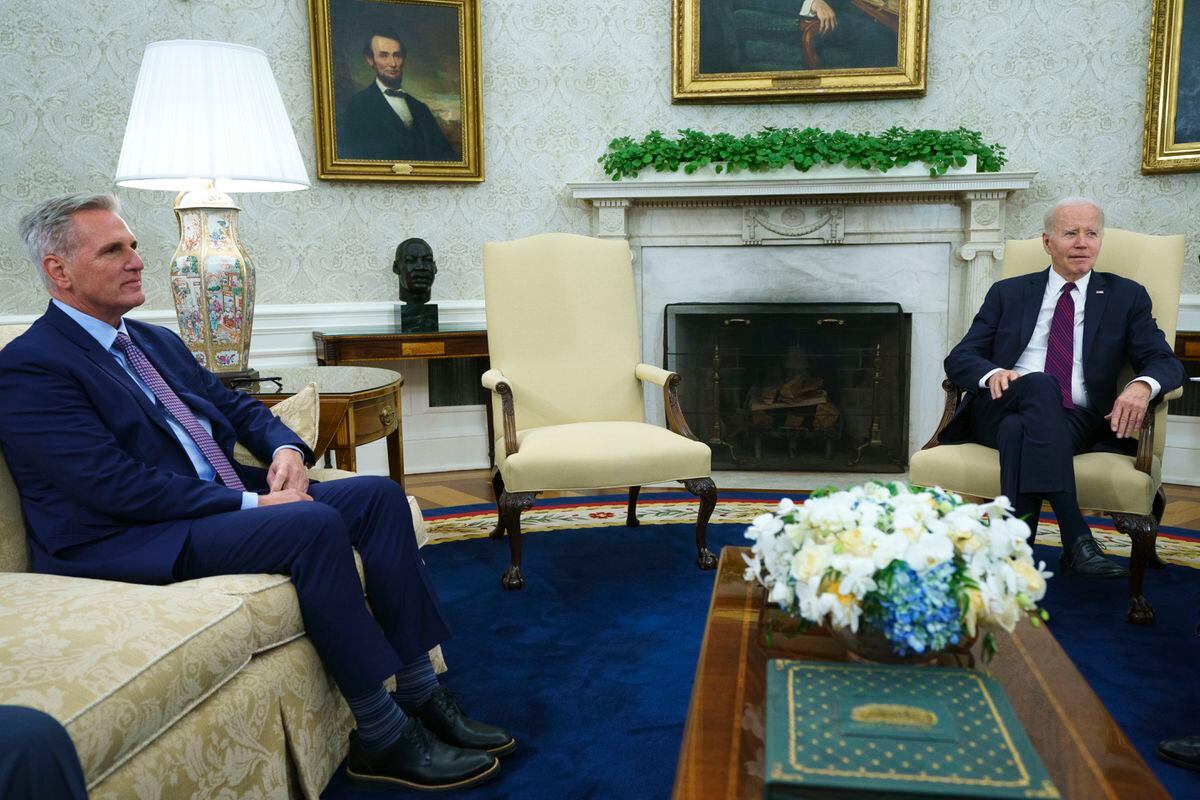It was a meeting in style, but without any result. The president of the United States, Joe Biden, has received this Tuesday afternoon at the White House the president of the House of Representatives, Republican Kevin McCarthy, and the other leaders of Congress in the Oval Office of the White House. The meeting was so high-level that the president joked at the beginning of it with reporters: "We're going to get going, solve all the problems in the world." The meeting, however, has not allowed any progress to unlock the expansion of the debt ceiling. "I haven't seen any new movement," McCarthy summarized. Expectations, in reality, were not very high.
The president of the House of Representatives has appeared before the media with the leader of his party in the Senate, Mitch McConnell, also present at the meeting, in a defiant tone and complaining that Biden has not agreed to enter negotiations on the debt ceiling until there is barely time: "That is no way to govern." has said. The White House "doesn't have a plan B," he added.
Treasury Secretary Janet Yellen warned last week that date X by which the U.S. could run out of money to meet its obligations may come as early as June 1, though leaving open the possibility of a longer deadline. The debt ceiling, 31.38 trillion dollars, was reached in January and since then the government is working with extraordinary measures that have left a temporary respite. Moody's and investors placed date X in mid-August.
Biden and his spokesman have repeatedly repeated that it is the responsibility of Congress to expand the debt limit and that it must do so without conditions. Democrats consider that blackmail, hostage-taking for which they ask for a bailout, and emphasize that during Trump's presidency Congress raised the debt ceiling three times without asking for cuts in return.
Hakeem Jeffries, the Democratic leader in the House of Representatives, another of the attendees, has been a little more conciliatory and has said that congressional leaders and their teams would continue discussions on the annual federal budget starting this Tuesday, at Biden's behest. Democrats are open to some spending cuts as long as they are not tied to the threat of default. They want it to be part of the budget negotiation, but not the debt limit negotiation.
The Republican majority in the House of Representatives has approved a bill that would raise the debt ceiling, but in exchange for cuts in numerous items and for Biden to give up some of the main achievements of the first half of his term, including measures of the Reduction of Inflation Act and the partial cancellation of the debt of college students.
The proposal has no future in the Democratic-controlled Senate, but it gives McCarthy a trump card: "We've both said default is not an option, but only one of us has acted," he says. "I've asked the president this simple question: Don't you think there's somewhere we could find savings?"
The fourth congressional leader present at the meeting, Charles Schumer, who leads the Democrats in the Senate, has attacked McCarthy saying he is "putting America in great danger." "Using the risk of default, with all the dangers it has for the American people, as a hostage and saying it's my way or not, it's mostly my way or not, it's dangerous," Schumer said.
The proof that there was not the slightest hope of reaching an agreement is that the president of the United States, Joe Biden, had already scheduled a public event for this Wednesday in which he warned that it was to criticize the Republican position and the cuts it entails and to demand an increase in the debt ceiling without conditions.
There are theoretical alternatives that would make it possible to find a way out. One of them is to go to the power to mint platinum coins of any value and throw the trillion dollar coin, deposit it in the Federal Reserve and raise funds with it. There are also possibilities for financial engineering: the Treasury could issue debt with a low nominal value but a very high coupon or interest or swap debt to obtain more resources without exceeding the authorized nominal value.
There has been speculation about another possibility that could lead to a constitutional conflict. The fourth paragraph of the 14th Amendment to the Constitution says that "the validity of the public debt of the United States, authorized by law (...) it should not be questioned." Using that rule to justify the issuance of new debt with which to pay the existing one would be a very controversial interpretation. McCarthy said those issues were not part of Tuesday's discussion: "None of that has been raised," he told reporters.
The possibility of a temporary suspension or extension of the debt ceiling that allows closing the budget year that ends on September 30 and incidentally gain time for negotiation does not seem a realistic option at the moment either. Congressional leaders will meet again Friday.
Follow all the international information on Facebook and Twitter, or in our weekly newsletter.

